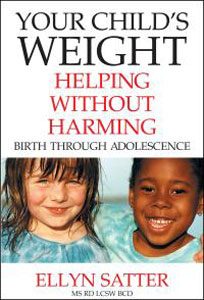

Family Meals Focus
The Ellyn Satter Institute Newsletter
Labeling overweight children as obese
by Ellyn Satter, Registered Dietitian and Family Therapist
Don’t let your child be labeled overweight or obese. Childhood overweight/obese designations have become even more harmful than before: Over 85th percentile is “overweight.” Over 95th percentile is “obese.” Parents often refuse to accept these labels for their children. From the Satter Feeding Dynamics Model (fdSatter) perspective, their reluctance is well-founded, as many large children’s size is simply normal. However, if a child’s weight shows abnormal acceleration at any percentile level, there is a potential problem that needs to be addressed.
BMI cutoffs are misused
This slippage grew out of a January, 2007 Committee Statement and recommendation1 and was made official by a National Health Statistics report.2 To its credit, NHS authors temporize about the legitimacy of such designations. Less than half of ”obese” children (those with BMI ≥ 95) have a high percentage of body fat. Moreover, the consensus in the literature is that it is difficult to come up with any definition of child overweight or obesity.2 The problem arises from the manner in which those terms – and definitions – are used. However the BMI levels are labeled, they are statistical cutoff points established for the purpose of population-wide evaluation. As such, they are not appropriate for diagnosis of individual children. Despite the shortcomings of the definition, that is exactly the way they are used. Little wonder that parents are unwilling to accept and act on a weight-related diagnosis for their child.3
The real problem is weight acceleration
Labeling children overweight or obese makes them feel flawed: not smart, not physically capable, and not good about themselves.
To remind you, fdSatter says that the issue with weight not high weight per se, but weight acceleration: Abnormal upward weight divergence for the individual child. Such divergence gives a clue to distortions in feeding. Those distortions can be corrected by instituting a division of responsibility and feeding optimally throughout the child’s growing-up years.4 The whole issue of whether or not the child is overweight can responsibly be side-stepped – it really isn’t important. What is important is helping parents do a good job with feeding and letting the child grow up to be the weight that is right for him or her.
Labels harm children and parents
- Children who are labeled overweight feel flawed in every way: not smart, not physically capable and not good about themselves.5 How much worse is it for children labeled obese?
- Parents who are concerned about child overweight or have anti-fat attitudes are likely to restrict children’s food intake.6 Parental feeding restriction is associated with increased child food intake and higher child body weight.7 How much greater will parental tendencies and child weight gain be if children are labeled obese?
- Controlling for child weight, increased child BMI z scores over several years correlate strongly with parents’ concern about child weight and perceived child overweight.8 How much more will BMIs accelerate if children are labeled obese?
- Children whose food has been restricted have an increased likelihood of restricting themselves as they get older. Currently, at least two-thirds of adolescent boys and girls restrict their food intake to lose weight.9 How many more adolescents will diet if they are labeled obese in earlier life?
- Such dieting is as counterproductive for adolescents as for younger children. Controlling for beginning weight, adolescents who diet by either healthful or unhealthful means are heavier five years later than adolescents who do not diet.10 What would those adolescents have weighed if they had been fed well, given opportunities to be active, and allowed to develop—and value—the bodies that nature intended for them?
References
- Barlow SE, and the Expert C. Expert Committee Recommendations Regarding the Prevention, Assessment, and Treatment of Child and Adolescent Overweight and Obesity: Summary Report. Pediatrics. 2007;120(Supplement_4):S164-192.
- Ogden CL, Flegal KM. Changes in terminology for childhood overweight and obesity. Hyattsville, MD: National Center for Health Statistics;2010.
- Rhee KE, De Lago CW, Arscott-Mills T, Mehta SD, Davis RK. Factors Associated With Parental Readiness to Make Changes for Overweight Children. Pediatrics. 2005;116(1):e94-101.
- Satter EM. Your Child’s Weight: Helping Without Harming. Madison, WI: Kelcy Press; 2005.
- Davison KK, Birch LL. Weight status, parent reaction, and self-concept in five-year-old girls. Pediatrics. 2001;107:46-53.
- Musher-Eizenman DR, Holub SC, Hauser JC, Young KM. The relationship between parents’ anti-fat attitudes and restrictive feeding. Obesity (Silver Spring). 2007;15:2095-2102.
- Birch LL, Davison KK. Family environmental factors influencing the developing behavioral controls of food intake and childhood overweight. Pediatr Clin North Am. 2001;48(4):893-907.
- Faith MS, Berkowitz RI, Stallings VA, Kerns J, Storey M, Stunkard AJ. Parental feeding attitudes and styles and child body mass index: Prospective analysis of a gene-environment interaction. Pediatrics. 2004;114(4):e429-436.
- Neumark-Sztainer D, Hannan P, Story M, Perry C. Weight-control behaviors among adolescent girls and boys: implications for dietary intake. Journal of the American Dietetic Association. 2004;104:913-920.
- Neumark-Sztainer D, Wall M, Guo J, Story M, Haines J, Eisenberg M. Obesity, disordered eating, and eating disorders in a longitudinal study of adolescents: how do dieters fare 5 years later?Journal of the American Dietetic Association. 2006;106:559-568.
Explore
Understand and Apply ecSatter
For help with raising your big child or your small child to feel good about himself and have the body that is right for him, read Ellyn Satter's Your Child’s Weight: Helping Without Harming
Address weight wisely and well
- Avoid restriction
- Children know how much they need to eat
- Follow Satter’s Division of Responsibility in Feeding(sDOR)
- Raise a healthy child who is a joy to feed
- Resolve the weight dilemma

